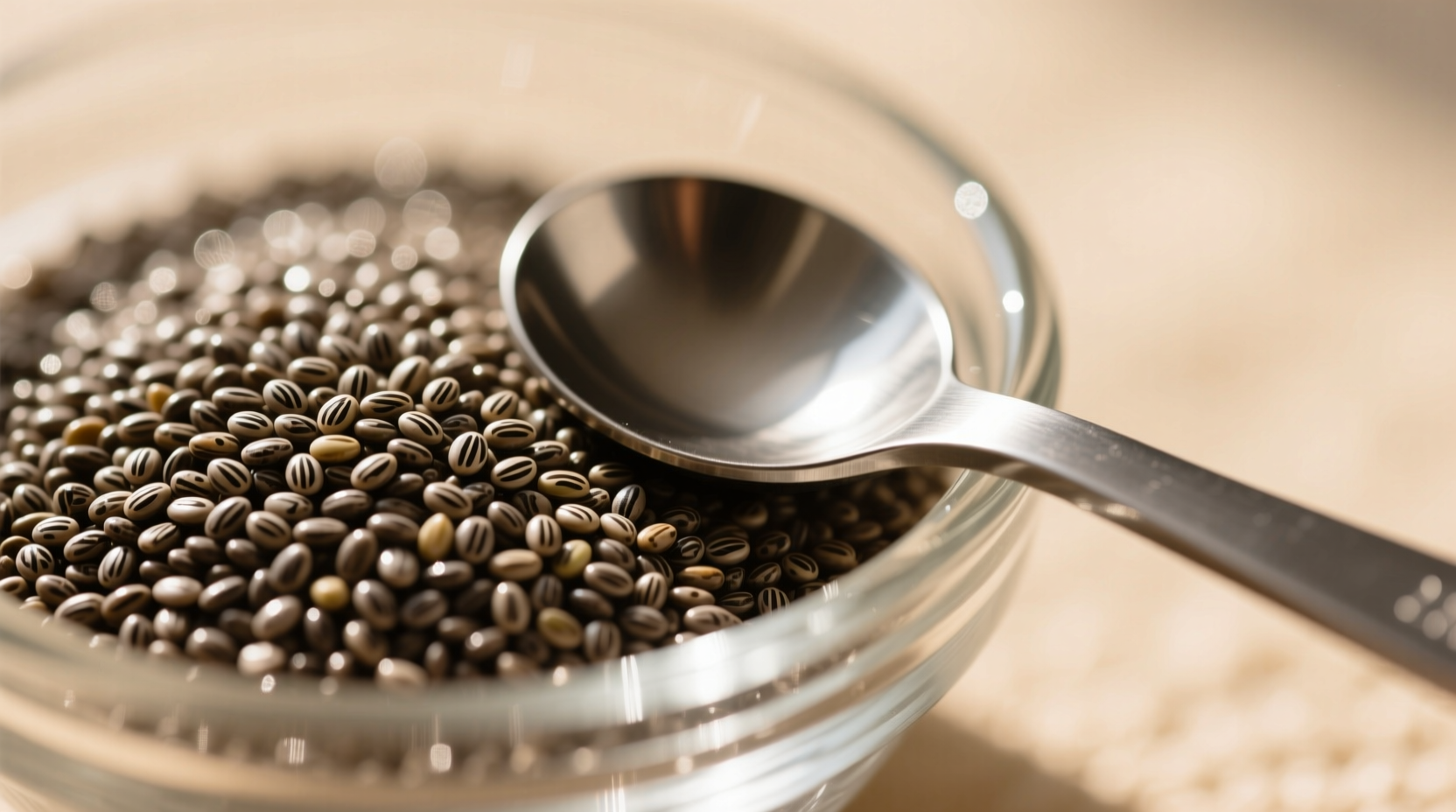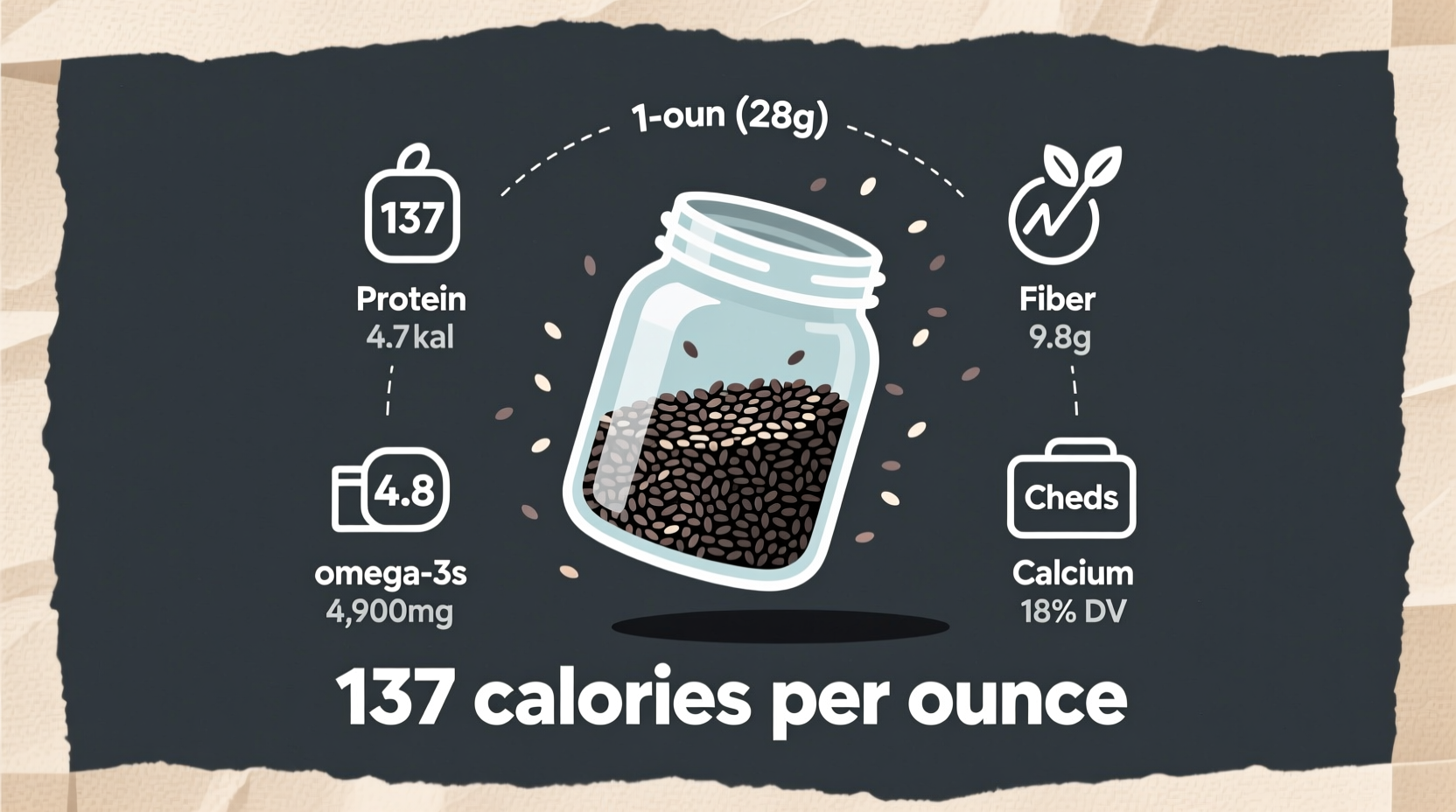When you're tracking your daily nutrition, knowing exactly how many calories in chia seeds per serving helps you make informed dietary choices. Chia seeds pack substantial nutritional value into their modest calorie count, offering benefits that extend far beyond basic energy provision.
Chia Seed Nutrition: Beyond the Calorie Count
While the calorie information answers your immediate question, chia seeds' true value lies in their impressive nutritional profile. These tiny seeds deliver remarkable benefits relative to their caloric content, making them a smart addition to balanced eating plans.
According to the USDA's FoodData Central (the gold standard for nutritional data), here's what you get in a standard 28-gram (1 ounce) serving of dry chia seeds:
| Nutrient | Amount per 28g | % Daily Value* |
|---|---|---|
| Calories | 138 | 7% |
| Total Fat | 8.7g | 11% |
| Saturated Fat | 1g | 5% |
| Carbohydrates | 12.3g | 4% |
| Dietary Fiber | 9.8g | 35% |
| Sugar | 0g | 0% |
| Protein | 4.7g | 9% |
*Percent Daily Values based on a 2,000 calorie diet. Source: USDA FoodData Central, Release 17
This nutritional breakdown reveals why chia seeds earn their superfood status. That 138 calories in chia seeds delivers nearly one-third of your daily fiber needs and significant amounts of essential nutrients. Unlike many high-calorie foods, chia seeds provide sustained energy without blood sugar spikes thanks to their balanced macronutrient profile.
Practical Calorie Management with Chia Seeds
Understanding how many calories in a tablespoon of chia seeds (approximately 58 calories per tablespoon) helps you incorporate them strategically into your diet. Many people make the mistake of adding chia seeds to their meals without accounting for these calories, potentially undermining their dietary goals.
Here's how to use chia seeds effectively while managing your calorie intake:
- Portion control matters: A single serving (28g) provides maximum benefits without excessive calories. Use a kitchen scale for accuracy, as volume measurements can vary.
- Hydration is key: When chia seeds absorb liquid (as they do in puddings or smoothies), they expand significantly. This increases satiety while keeping calorie density manageable.
- Avoid hidden calories: Pre-made chia seed products often contain added sugars. Check labels for products like how many calories in chia seed pudding which can double or triple the calorie count.
Research published in the Journal of Food Science and Technology confirms that chia seeds' high fiber content promotes feelings of fullness, potentially reducing overall daily calorie consumption despite their modest caloric density.
Contextualizing Chia Seed Calories in Your Diet
When evaluating how many calories are in chia seeds, consider their nutritional context compared to other common seeds:
- Chia seeds (28g): 138 calories, 9.8g fiber, 5g protein
- Flax seeds (28g): 150 calories, 7.6g fiber, 5.1g protein
- Hemp seeds (28g): 166 calories, 1.2g fiber, 9.2g protein
- Sunflower seeds (28g): 164 calories, 3.9g fiber, 5.8g protein
What makes chia seeds stand out is their exceptional fiber-to-calorie ratio. While all these seeds offer nutritional benefits, chia's 35% daily fiber value per serving provides significant digestive and metabolic advantages that influence how your body processes those 138 calories in chia seeds.
It's important to note that preparation method affects caloric impact. Dry chia seeds have the standard 138 calories per ounce, but when soaked, they absorb 9-12 times their weight in water, effectively reducing calorie density per volume. This explains why how many calories in soaked chia seeds appears lower when measured by volume rather than weight.
Maximizing Chia Seeds' Nutritional Value
To get the most from those calories in chia seeds without exceeding your daily energy needs, consider these evidence-based strategies:
- Replace higher-calorie thickeners: Use chia seeds instead of cornstarch or flour in recipes. One tablespoon of chia seeds can replace one tablespoon of these higher-calorie alternatives.
- Enhance protein absorption: Pair chia seeds with plant-based proteins. The fiber and healthy fats in chia improve the bioavailability of protein from sources like beans and lentils.
- Optimize hydration: Consume chia seeds with adequate water. Properly hydrated chia seeds form a gel that slows digestion, providing sustained energy release from those 138 calories.
A clinical trial published in Nutrition Research demonstrated that participants who consumed chia seeds as part of their breakfast experienced more stable blood sugar levels throughout the morning compared to those who consumed equivalent calories from refined carbohydrates.

Common Misconceptions About Chia Seed Calories
Several myths persist about how many calories in chia seeds that could affect your dietary planning:
- Myth: “Chia seeds have negative calories”
- Fact: While chia seeds require energy to digest due to their high fiber content, they still contribute net calories to your diet. The thermic effect of food for chia is estimated at 5-10%, meaning you absorb approximately 124-131 of those 138 calories.
- Myth: “All chia seed products contain the same calories”
- Fact: Commercial chia seed products vary dramatically. A store-bought chia seed drink might contain 150-250 calories per serving due to added sugars, while homemade versions with just chia and water contain only the natural 138 calories per ounce.
Understanding these distinctions helps you make informed choices about how many calories in chia seeds based on your specific preparation method and dietary goals.
Practical Incorporation Strategies
Here's how to incorporate chia seeds while managing your calorie intake effectively:
- Smoothie booster: Add one tablespoon (58 calories) to your morning smoothie for added fiber and omega-3s without significantly increasing calorie count.
- Egg substitute: Replace one egg (70 calories) with one tablespoon chia seeds mixed with 2.5 tablespoons water (58 calories) in baking recipes.
- Oatmeal enhancement: Stir one tablespoon into your oatmeal (adds 58 calories but dramatically increases satiety).
- Homemade energy bars: Use chia seeds as a binding agent in energy bars, replacing higher-calorie ingredients like honey or syrup.
Remember that while how many calories in chia seeds is an important metric, their true value comes from the comprehensive nutritional package they deliver. The 138 calories per ounce provide sustained energy, digestive support, and essential nutrients that make them worth incorporating into a balanced diet.











 浙公网安备
33010002000092号
浙公网安备
33010002000092号 浙B2-20120091-4
浙B2-20120091-4